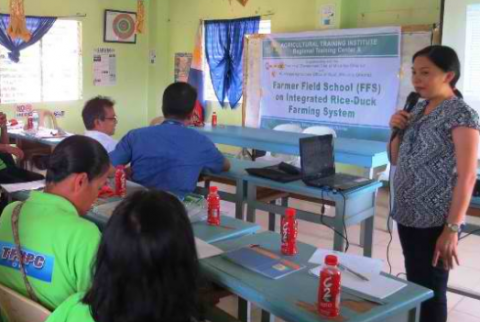Resident vet Dr. Marily V. Figuracion delivered the training overview to the FFS participants
A total of 21 participants attended the said event. Some were from the Camaroc Farmers Association and others were from the Taboc Farmers MPC.
The training is divided into three modules: Introduction to Integrated Rice-Duck Farming System (IRDFS), Basic Practices and Economics, respectively. The first module is compose of the developmental background, framework and benefits, as well as the characteristics of ducks. The second module on the other hand is more on the application side including land preparation, transplanting and duckling selection, duck housing preparation and installation, duck management and other practices deemed necessary for successful production. The last module is a discussion about the factors which leads to the increase and decrease of the production as well as the cost and return analysis.
The group would meet every Thursday per week from 8:30 AM until 11:00 AM, together with the representatives of the partner agencies and the technical consultant of the group.
In the welcome address given by Ms. Sarah O. Abella, the Acting Municipal Agriculturist of Opol, she emphasized to the participants how the season long training is helpful in their way of living. She had also expressed her gratitude towards ATI for always giving trainings for their municipality.
According to Dr. Benjamin B. Resma, the Provincial Veterinarian and the Acting Provincial Agriculturist, FFS on IRDFS is given the highest priority in their office as of this time because the governor believes that this project could greatly impact the living standards of the farmer participants.
The activity was also graced by the technical consultant, who is the founder and Chief Executive Director of the Rice-Duck Movement, Philippines, Mr. Jose Apollo Y. Pacamalan. He stressed out that so far, the IRDFS is the best technology for rice farming since this incurs lower cost and entails great profit. He further said that this technology has been perfected and is being used all over Asia, specifically in Japan, Korea and Singapore. But despite the success of the technology, he also shared about the challenges and hardships one could encounter upon engaging in such technology. Among them are: (1) the timing between when to plant and when to let loose the ducklings in the field and (2) the starting capital of the farmer participants.
Mr. Efren G. Macario gave some tips on how to make the aforementioned technologies successful. He gave emphasis on expanding one’s network and being an innovator – that one should not copy entirely what is being taught since different farms and places entail different weather and costs, respectively.
Moreover, he also stressed that there would always be failure and if one could not and would not be able to take care of the farm itself, then it would be better not to engage with the technology because intensive care and monitoring is needed.
The launching signified the start of the growth of profitable farmers. Through the participants’ hardwork, cooperation, dedication, patience and willingness to be taught and apply new techniques, the Integrated Rice-Duck Farming System (IRDFS), which was once thought of as impossible, could be a promising new venture for the farmers.

